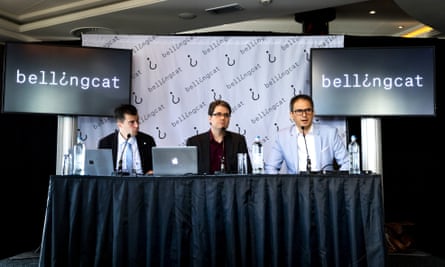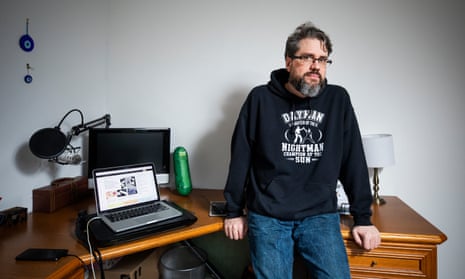Eliot Higgins launched Bellingcat in summer 2014, days after the Russian military shot down Malaysian Airlines MH17 over eastern Ukraine. The online outfit has broken a series of international scoops. In 2018 it discovered the identities of the two undercover assassins who poisoned Sergei Skripal in Salisbury. Last year Bellingcat revealed extraordinary details of the plot by Russia’s FSB spy agency to poison the opposition leader Alexei Navalny.
Higgins’s first book tells the story of how open source investigation has redefined reporting in the 21st century. He argues that the internet can still be a force for good, despite bad actors, complacent technology firms and an explosion in alternative “facts”. Higgins lives in Leicester with his wife, daughter and son.
Why did you write We Are Bellingcat?
I was approached a few years ago after we investigated the shooting down of Malaysian Airlines MH17. It didn’t feel like the right time. Open source techniques were still developing. I was asked again to write a book after Skripal was poisoned in Salisbury. It was a better moment. So much happened with our work on Skripal. There was increasing interest in the justice and accountability side of open source investigation.

How did it feel to work with Alexei Navalny? And are you responsible for the street protests after he flew home and was arrested?
Navalny thought it would take decades to find out who poisoned him with novichok in Siberia. Even then he expected to discover one person. We thought there is no way they [the Kremlin] would be crazy enough to poison Navalny. It turns out it was the FSB, Vladimir Putin’s spy agency. We were stunned. We were able to give Navalny the whole story. The episode will feature in an updated edition [of the book]. We have been told anecdotally that anti-government demonstrators have referenced our FSB exposé. But we don’t want to take credit. It was a brave thing for Navalny to go back, knowing what he faced, and that they had tried to kill him more than once.
Your book argues against ‘cyber-miserablism’ and says people still care about the difference between truth and lies. How bad is the problem of fake news and the growth of what you call ‘counter-factual communities’?
If you live in a western democracy it’s easy to think everything is going to be OK and someone will sort it out. In fact, people spend more time on the internet and grow less informed. We try to add value, to offer good nodes of information. Anyone can participate in open source research. There’s no permission structure. I hope people will look at my example – I’m a fairly ordinary person – and feel it’s something they can do. Insane online communities have been decades in the making. It started with Fox News, creating these alternative media bubbles. In one sense it’s funny. In another it’s terrible and drowning US society. The worrying thing is when the bad stuff is being produced at a faster rate than good stuff is adopted. All we can do is educate our children and steer them away from crazy online culture.
How does it feel being a Kremlin hate figure?
It’s nice they pay attention to Bellingcat. I think we would have been disappointed if Putin had not mentioned us at his annual press conference after our Navalny scoop. Abuse from trolls is something I have come to accept in my life. What we do, revealing things, is worthwhile, despite the potential threats. I’m trying to wean myself off Twitter. People constantly accuse me of being a liar or working for the CIA. It winds you up.
What books are on your bedside table?
I’m trying to finish Mary Trump’s book, Too Much and Never Enough. I’m halfway through. I find it a really interesting insight into Donald Trump’s horribly broken brain, and where it comes from. John Bolton’s book, The Room Where It Happened, is deeply boring. A self-congratulatory slog through his career. With two kids being home-schooled I have five seconds to think about books.
Which writers influenced your thinking?
As a teenager I read people who wrote from a leftist perspective. Naomi Klein’s No Logo, Robert Fisk’s book on Lebanon, Pity the Nation, Noam Chomsky, etc. I was reading a lot of John Pilger and Seymour Hersh. Later, most of them turned out to hate me. They seem to think I’m part of a global conspiracy against Syria to re-run the invasion of Iraq. It’s a funny old world. Hersh was once a great journalist. But he has a dismissive attitude towards online material, has previously said he doesn’t use the internet. There are 200 videos of the 2013 sarin attacks [by the Assad regime on a Damascus suburb]. To ignore them is arrogant and blinkered. Liberal leftists of a certain age often suffer from horrible bigotry. It robs Muslims in the Middle East of agency and authenticity, as victims or as perpetrators.
What kind of reader were you as a child?
As a kid I was introverted and shy. My father was an RAF engineer and we moved frequently. At my grammar school in Shropshire I was miserable. I liked Choose Your Own Adventure books. Between 13 and 16 I read horror and crime: Stephen King, and the British writers James Herbert and Shaun Hutson. I liked James Herriot. I would read one book by an author, then all of them.
What will you do next?
We are Bellingcat is to be published in various foreign editions. It will come out later this year in a Russian translation. I imagine it won’t reach Putin’s reading pile. We are currently in discussion with production companies about a documentary podcast or TV series, or both. It would showcase our work on Russian spies.
